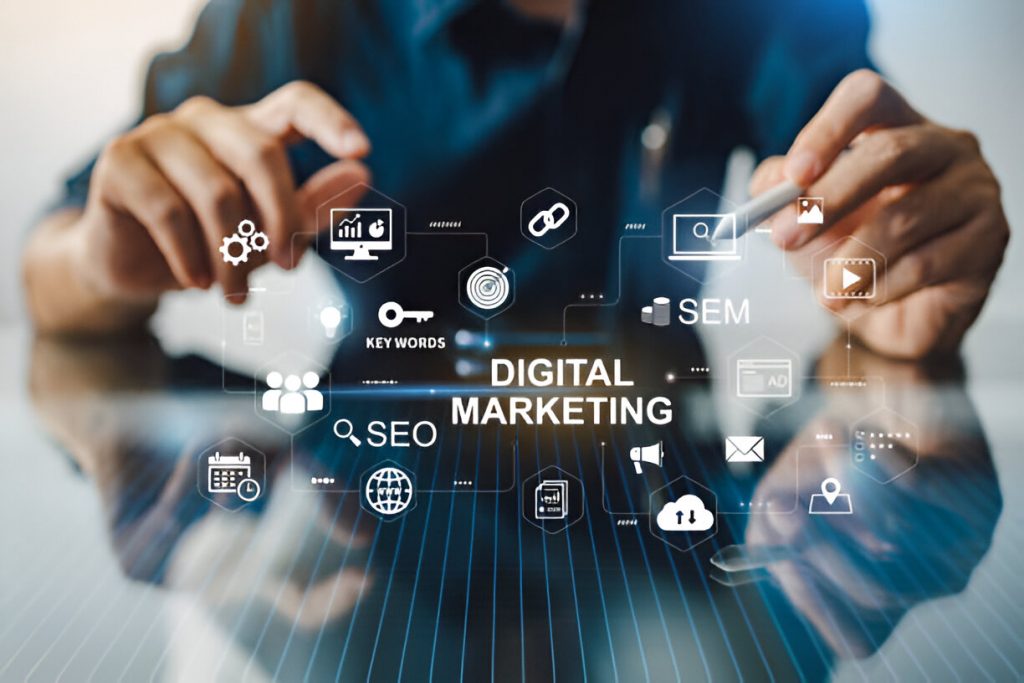Understanding digital marketing is crucial for today’s businesses aiming to thrive in a competitive market. Digital marketing encompasses all marketing efforts that utilize electronic devices or the internet. Companies leverage various digital channels such as search engines, social media, email, and websites to connect with current and prospective customers.
The importance of digital marketing for businesses cannot be overstated:
The Role of SEO in Digital Marketing:
- Cost-effectiveness: Digital ads are often more cost-effective than traditional advertising methods. Platforms like Google Ads or Facebook Ads offer ad spend credits for new advertisers, making it a budget-friendly option.
- Targeted Advertising: Digital marketing allows businesses to target specific demographics and interests, ensuring your message reaches the right audience. Whether targeting by age, gender, income level, job title, or location, digital platforms offer unparalleled precision.
- Analytics & Tracking: Free tools like Google Analytics provide detailed insights into engagement and sales conversion. These tools help you understand who your audience is and how they interact with your content.
Digital marketing’s significance lies in its ability to promote brands anytime users check their smartphones or desktops. It facilitates customer engagement through review management, social media posts, and email newsletters.
Leverage the power of digital marketing by exploring resources like Visuapex Creatives that can guide you on this journey. Embracing digital marketing ensures you stay ahead in an ever-evolving marketplace.
What is Digital Marketing?
Digital marketing refers to the use of online platforms and digital technologies to promote products or services. This marketing strategy encompasses a broad range of tactics and channels aimed at reaching potential customers through the internet.
Key Channels and Tactics in Digital Marketing:
- Search Engine Optimization (SEO): Enhancing a website’s visibility on search engines like Google by optimizing content for relevant keywords.
- Content Marketing: Creating and distributing valuable content to attract and engage a target audience. This includes blog posts, eBooks, videos, and infographics.
- Social Media Marketing: Leveraging platforms like Facebook, Instagram, LinkedIn, and Twitter to interact with audiences and promote brand messages.
- Email Marketing: Sending targeted emails to prospects and customers to nurture relationships and drive conversions.
- Pay-Per-Click (PPC) Advertising: Running ads on platforms like Google Ads or social media channels where advertisers pay each time their ad is clicked.
- Affiliate Marketing: Partnering with other businesses or influencers who promote your products in exchange for a commission on sales generated from their referrals.
Digital marketing provides numerous opportunities for businesses to connect with audiences in innovative ways. By utilizing these diverse channels, you can craft comprehensive strategies tailored to specific business goals.
How Does Digital Marketing Work?
Digital marketing strategies are designed to achieve specific business goals by leveraging various online channels and tactics. These strategies typically begin with identifying clear objectives, such as increasing brand awareness, driving website traffic, or boosting sales.
Steps in Implementing Digital Marketing Strategies:
○ Research and Analysis: Conduct market research to understand customer behavior and preferences.
○ Analyze competitors’ digital marketing efforts to identify gaps and opportunities.
○ Target Audience Identification: Use demographic data, interests, and online behaviors to define your target audience.
○ Tools like Google Analytics and social media insights help in segmenting the audience effectively.
○ Channel Selection: Choose appropriate digital channels based on where your target audience spends their time. Common channels include social media, email marketing, search engines, and content marketing.
○ Content Creation: Develop engaging content that resonates with your audience. This can include blog posts, videos, infographics, and social media updates.
○ Campaign Execution: Launch campaigns across selected channels. Utilize SEO techniques for organic reach or paid ads for targeted exposure.
○ Monitoring and Optimization: Continuously monitor campaign performance using analytics tools. Track key metrics like engagement rates, click-through rates (CTR), and conversion rates.
○ Optimize campaigns based on data insights to improve performance.
Key Elements of Effective Digital Marketing:
- Customer Engagement: Engaging customers through interactive content, social media interactions, and personalized emails builds relationships and loyalty.
- Brand Awareness: Consistent online presence enhances visibility and recognition of your brand among potential customers.
Implementing a well-rounded digital marketing strategy ensures that businesses can effectively reach their goals by staying connected with their audience and adapting to changing market trends.
Benefits of Implementing a Strong Digital Marketing Strategy for Businesses
- Cost-Effectiveness of Digital Ads: Digital marketing offers an exceptional advantage in terms of cost-effectiveness. Unlike traditional advertising channels, digital ads allow businesses to set precise budgets and spend only what is necessary. Platforms such as Google Ads and Facebook Ads offer ad spend credits for new advertisers, making entry into digital marketing more affordable. This budget flexibility ensures that even small businesses can compete with larger brands without breaking the bank.
- Targeted Advertising Based on Demographics and Interests: With digital marketing, you can precisely target your audience based on various demographics and interests. This level of targeting is unparalleled in traditional marketing methods. By using data points such as age, gender, income level, location, job title, and personal interests, you can ensure your ads reach the most relevant audience. This targeted approach not only increases the chances of conversion but also optimizes ad spend by focusing on potential customers.
- Free Analytics Tools for Tracking Engagement and Sales Conversion: One of the most significant benefits of digital marketing is the availability of free analytics tools. Tools like Google Analytics provide in-depth insights into your campaign performance, including demographic breakdowns of your page followers or website visitors. These tools help track engagement metrics and sales conversions, offering a clear picture of what works and what needs improvement. This data-driven approach enables continuous optimization of your marketing strategies, ensuring higher ROI and better business outcomes.
Using these elements effectively can significantly enhance your business’s digital presence and performance.
1. Facilitating Customer Engagement through Digital Marketing
Customer engagement is crucial for building brand loyalty. By consistently engaging with customers, you can keep your brand in their thoughts and develop a stronger connection with them. This connection is what turns occasional buyers into loyal advocates.
Ways to Facilitate Customer Engagement:
- Review Management: Responding to customer reviews, whether they are positive or negative, shows that you value their feedback. This interaction can improve customer satisfaction and encourage them to come back again.
- Social Media Posts: Platforms such as Facebook, Instagram, and Twitter provide opportunities for real-time interaction with your audience. By regularly posting content, sharing stories, and hosting live sessions, you can directly engage with your followers and build a community around your brand.
- Email Newsletters: Sending personalized newsletters is a great way to keep your customers updated on new products, promotions, and company news. By tailoring the content based on their preferences, you can make your communication more relevant and effective.
Customer engagement through digital marketing is not just beneficial but necessary for long-term business growth. It creates a two-way communication channel that allows you to better understand customer needs and consistently deliver value.
2. Increasing Brand Awareness with Effective Digital Marketing Campaigns
Brand awareness is crucial for any business to succeed. One of the key ways to achieve this is through digital marketing, which helps increase brand visibility and recognition on various online platforms.
Increasing Brand Visibility and Recognition
Digital marketing uses different methods to make a brand more well-known. Social media platforms such as Facebook, Instagram, Twitter, and LinkedIn allow businesses to directly connect with their target audience, creating a personalized experience that encourages brand loyalty. Content marketing through blogs, articles, and videos also helps establish a brand as an expert in their industry, leading to more organic traffic to their website.
Strategies for Using Digital Channels Effectively
There are several strategies that businesses can use to improve their brand awareness:
- Search Engine Optimization (SEO): By optimizing their content for search engines, businesses can ensure that their brand appears in relevant search results, increasing its visibility.
- Pay-Per-Click Advertising (PPC): Placing ads on platforms like Google AdWords or Bing Ads allows businesses to have their brand featured at the top of search results when users enter specific keywords.
- Influencer Marketing: Collaborating with influencers who have a large following can help businesses expand their reach and gain more credibility and recognition.
- Content Marketing: Consistently creating and sharing high-quality content helps attract and engage potential customers, establishing the brand as a trusted source of information.
By implementing these strategies together, businesses can effectively use digital marketing to ensure that their brand stays in the minds of potential customers whenever they are online.
Using these tactics collectively can significantly boost your brand’s presence in the digital space, ensuring it stands out in a crowded marketplace.
3. Driving Business Growth through Comprehensive Digital Marketing Strategies
Digital marketing plays a vital role in driving business growth. By utilizing a mix of strategies, it enables businesses to reach a wider audience and convert potential leads into loyal customers.
The Vital Role of Digital Marketing in Driving Business Growth
Digital marketing is crucial for business growth because it offers a variety of tools and tactics that can be tailored to meet specific objectives. These include:
- Search Engine Optimization (SEO): Enhances visibility on search engines, making it easier for potential customers to find your business.
- Pay-Per-Click Advertising (PPC): Drives targeted traffic to your website by placing ads on search engines and social media platforms.
- Content Marketing: Builds brand authority and trust by providing valuable information to your audience.
Reliance of Customers on Digital Marketing for Product Research and Purchasing Decisions
Customers heavily rely on digital marketing channels for product research and purchasing decisions. Before making a purchase, many turn to:
- Online reviews and testimonials: Help build trust and credibility.
- Social media platforms: Provide instant access to customer feedback and brand interactions.
- Email newsletters: Keep customers informed about new products, offers, and company news.
High Return on Investment (ROI) Offered by Digital Marketing
One of the most compelling reasons to invest in digital marketing is its high return on investment (ROI). Compared to traditional marketing methods, digital marketing often yields better results at a lower cost:
- Cost-effective campaigns: Platforms like Google Ads and Facebook Ads offer budget-friendly options.
- Measurable results: Tools like Google Analytics allow you to track performance in real-time.
- Targeted advertising: Ensures that your marketing efforts reach the right audience based on demographics, interests, and behaviors.
Driving business growth through digital marketing is not just about reaching more people; it’s about reaching the right people with the right message at the right time. This approach helps businesses stand out in a crowded marketplace while optimizing their marketing budgets for maximum impact.
Conclusion
Digital marketing is crucial for business success in today’s competitive landscape. It offers various benefits such as cost-effectiveness, targeted advertising, and analytics tools that can help you reach a wide audience and effectively connect with customers.
By implementing effective digital marketing strategies, you can:
- Position your brand for growth
- Enhance visibility
- Achieve a high return on investment
So, make sure to leverage the power of digital marketing to stay ahead, connect with your target audience, and drive your business forward.
FAQs (Frequently Asked Questions)
Digital marketing refers to the use of online platforms and channels to promote products or services, engage with customers, and build brand awareness.
Search Engine Optimization (SEO) is a key tactic in digital marketing, as it enhances a website’s visibility in search engine results. Other key channels include social media marketing, email marketing, content marketing, and pay-per-click advertising.
Digital marketing strategies are designed to achieve specific business objectives by leveraging various online channels and tactics to reach and engage with target audiences.
The first step is research and analysis, which involves conducting market research to understand the target audience. This is followed by strategy development, implementation, and ongoing optimization.
Customer engagement is a key element of effective digital marketing, as it involves engaging customers through interactive content and personalized experiences to build brand loyalty.
Digital marketing offers cost-effectiveness, targeted advertising based on demographics and interests, free analytics tools for tracking engagement and sales conversion, facilitating customer engagement, increasing brand awareness, visibility and recognition, driving business growth, reliance of customers on digital marketing for product research and purchasing decisions, and high return on investment (ROI).




